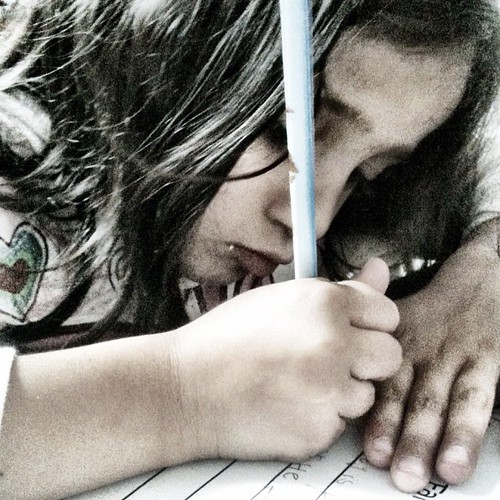
Dear Julie,
Hi! I just came across your Brave Writer website from a fellow homeschool mom and it sounds great.
I have a 7 year old daughter who writes very well, she creates stories and illustrations, and she also does copywork, all on her own. She is a good reader, too. I pretty much stay on the side of this whole natural process. I supply supplies for her and give her encouragement and listen when asked but pretty much not actively involved in it.
We are getting ready for a move from California to Indiana and we are planning on a 2 week camping trip from CA to IN. Camping down the coast of CA to the Grand Canyon and on from there. She has been designated as our Secretary and Artist of our trip. I took her and she picked out a travel journal and a special drawing pad and pencils. Can you think of anything further I can do to encourage this process? She has been actively involved in the planning, too and has already prepared a scrapbook for our photos. I am thinking that on a daily basis, back at camp, we can sit and record our days activities. Should I do it with her? What are your thoughts? I already have a notebook filled with all the things that we are hoping to see on the way. Should I also get a travel journal and we do it together? I want it to be fun for her. Should you have any further ideas or suggestions, please let me know!
Thanks for your consideration.
Sincerely, Renee
—
Hi Renee.
Great question! We drove across country from California to Ohio ten years ago and took a similar route. I think you’ve already got as much going on to encourage her as possible. The main thing to keep in mind is the opposite. Don’t push. Let this project ebb and flow as suits the trip. You might even take this attitude. Rather than trying to get her to be stimulated or interested, each night you can pull out your own journal, markers, stickers, maps, scotch tape etc. and begin working on your own book. If she wants to join you, how much more fun! You may even consider turning on music to create a mood (if appropriate). As you go through your trip, collect old tickets to museums or the Grand Canyon park. Glue these into the book too. Sketch as you go. Do your own book and she’ll want to do one too.
The main way to incentivize any activity, is to do it yourself. Kids want to do “adult” things. They love using grown up tools and participating in grown-up activities. If journal making is for her “education,” she may resist. If it’s the cool thing adults do on trips, she’ll likely be asking you to “get to do it too.” See what I mean?
You may find that activity therapeutic for you too. One thing I’ve noticed in homeschool is that many moms are so thrilled by the possible activities and studies, they feel compelled to “get their kids to do them” so that they can enjoy those same activities vicariously. I say, “Do the activity! Right in front of your kids.” Let them see you having fun, learning, buying supplies, getting absorbed. They’ll be drawn to try it out. Remember, though, sometimes even the coolest projects aren’t interesting to our kids. Or they try them for a few days and then are done. There’s no right length to this project, no right number of pages or days. Enjoy it as long as there is interest and time. If there isn’t time, you can do it once you return home. Keep the souvenirs and fill the journal in then.
Above all: savor the trip! Don’t ruin it with nagging or heavy-handedness. Have a great time, and save a little of it in journals. (smile)
Julie























